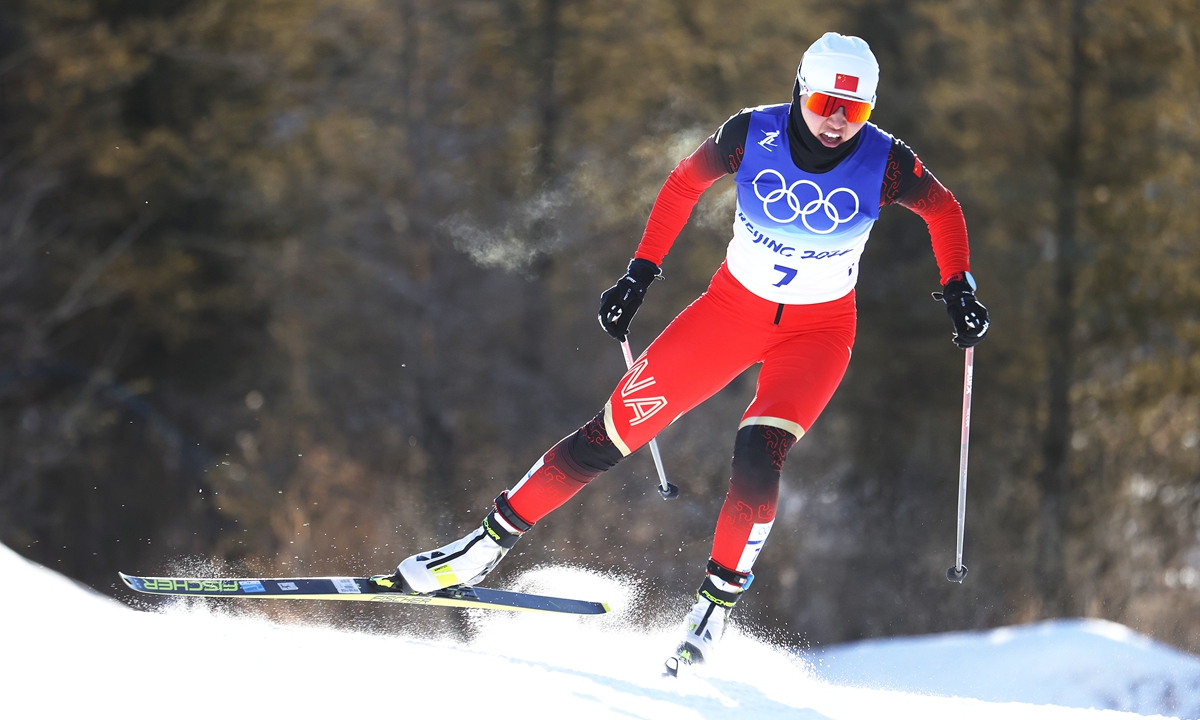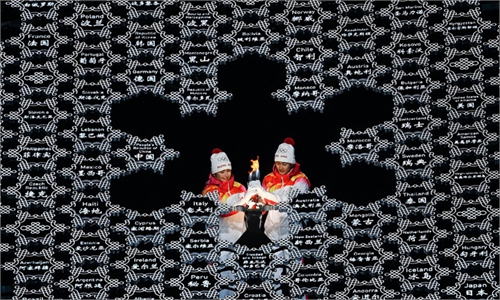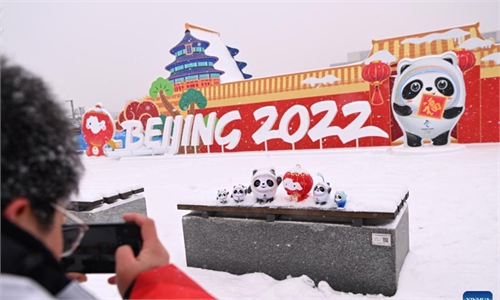SPORT / OLYMPICS
Athlete from Xinjiang region refutes rumors, shares interesting stories in Olympic Village

Bayani Jialin of Team China competes during the women's cross-country sprint free qualification at Beijing 2022 on February 8, 2022 in Zhangjiakou, Hebei Province. Photo: VCG
There are always light and fun moments when athletes from across the globe enjoy their non-competition leisure times in the Olympic Village."There are foreign athletes asking the manicurist to draw a Bing Dwen Dwen for them, but the manicurist said, 'No, no, no, it's too difficult!'" Bayani Jialin, a 22-year-old Chinese athlete, shared interesting stories from the Olympic Village with Global Times reporters in an exclusive interview.
In the context of the US-led West's continuous efforts of using Xinjiang-related topics to smear China, some Western media had paid special attention to some athletes from Northwest China's Xinjiang region during the Beijing 2022 Winter Olympic Games, claiming that China is using athletes from the region as "propaganda tools."
Bayani, who come from the Altay prefecture of the Xinjiang region - a place that has been traced as the origin of skiing - said that participating in the Olympic Games is a precious experience for every athlete, and those Western media that have used political topics to hype athletes from the Xinjiang region should have empathy. And for Bayani herself, attending the Beijing 2022 Winter Olympic Games was a dream come true.
In the 4x5km relay competition for cross-country ski on February 12, the Chinese team - composed of Chi Chunxue, Li Xin, Bayani and Ma Qinghua - placed 10th in the final competition, which was the best performance in history for Team China.
"Honestly, I had never heard of this sport before the age of 17," Bayani told the Global Times, as the winter sport started pretty late in China.

Bayani Jialin Photo: Screenshot from her interview with GT
In 2017, Bayani, who was good at running, was chosen by the Xinjiang winter sports management center as an athlete for cross-country skiing. Under the training of Norwegian coach Kristian Bjune Sveen, Bayani and other athletes started with basic training - running, simulation training and using skiing boards.Bayani's teammate Dinigeer Yilamujiang was one of the final-leg torchbearers who appeared at the opening ceremony on February 4.
"It is a great surprise to me! I knew only that she would attend the opening ceremony but I did not know that she would light the cauldron. I was touched and proud of her!" said Bayani.
However, some Western media, especially the New York Times and the Wall Street Journal, kept hyping Dinigeer and other athletes from the Xinjiang region, saying that choosing Dinigeer as the final torchbearer is Beijing's "riposte" to the West's criticism of China's human rights or that Dinigeer disappeared the second day after the opening ceremony and did not show up in the mixed zone.
In response to the Western media's hyping, Bayani said that she passed through the mixed zone with Dinigeer after their competition. As for the Western media's hyping, the two athletes did not discuss it as "it is not worth talking about," because such hyping showed the Western media did not show any respect to athletes from ethnic groups.
"As athletes, we work very hard to get the chance to participate in the Winter Olympics. Not everyone can get such a precious opportunity. I really wish that some Western media can have empathy and put their focus on the Olympics instead of politicizing the issue!" said Bayani.
To gain more experience, Bayani had attended many international competitions in many countries including Norway and Germany. She said that she felt proud of being a Chinese when foreign athletes talked about things in China, including the tasty food and high-speed trains. She would also introduce her hometown Altay to them.
Moreover, the facilities of the Beijing Winter Olympics are among the best in the world, Bayani said. "The services in the Olympic Village are also considerate, which had touched me."
When talking about the services in the Olympic Village, Bayani showed the Global Times reporters her nails, saying, "It is so funny that when I went to the manicurist, she told me that I was the first Chinese to visit her. We talked for two hours about foreign athletes. Many of them chose 'China Red," a color that they liked very much."
"Attending the Beijing Winter Olympics was a goal for me, and as it has been achieved, I have no regret now and I will hold the memory for life," said Bayani, adding that she also has a bigger goal for the future - to participate in the next Winter Olympics to be held in Italy in 2026.
The US media Inside claimed that athletes complained about cold weather and facilities of the Beijing Olympics and said that a Swedish athlete collapsed after a match.
However, Bayani said that athlete may have collapsed due to exhaustion rather than the weather.
"The average heart rate for an athlete is above 175 during the competition and this would keep for about 20 minutes. If this is running, the person would feel muscle soreness in the legs and arms," said Bayani.




